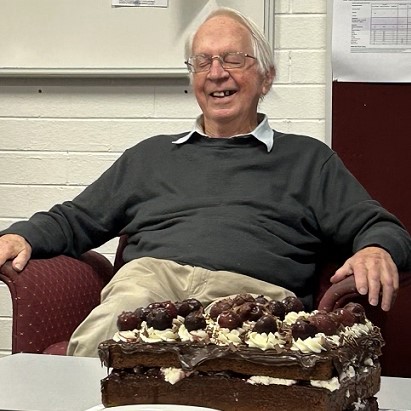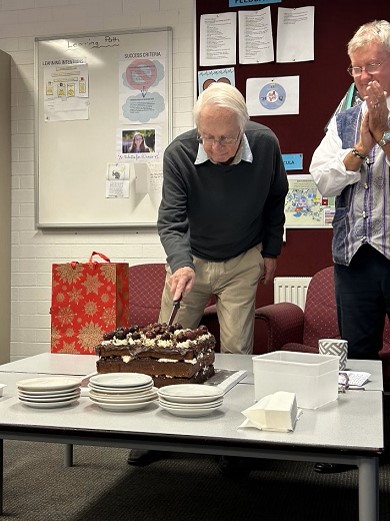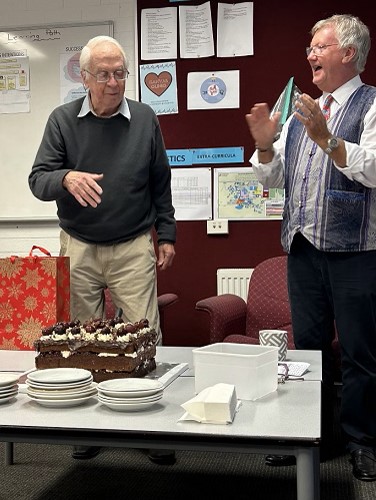Paul Cashen MSC: Homily for the Profession Anniversary – and John Franzmann MSC

No, that is not a photo of Paul Cashen. It is John Franzmann enjoying a quiet anniversary celebration at Chevalier College where John has lived for many years – decades. Scroll down to the end for a photo or two more. Thanks to John Mulrooney.
He and the others who celebrated have lived what Paul Cashen describes in his homily. This is Paul delivering his homily.

When we began to live religious life there was an emphasis on rules and regulations, set out clearly for those who entered the novitiate 61 yrs ago, or for Jim and Kevin (76 yrs ago) and so many others who trod the road before and after us.
The initial task for each of us was to over come our human weaknesses, and thus to live a perfect life in response to the mission ahead of us. What we heard was an ideal, described by the psalm today; “A pure heart create for me, O God“ Ps 50.
On average we were 18 years old when we began to try to be “perfect”. The efforts we undertook to be “perfect” soon caused us to stumble because of the difficulties we were not able live up to. Our human condition was deeply imbedded in our lives, and so we ran into the ideals of “perfection”; or the rules and regulations left no room for us to adapt to our everyday lives.
Jesus reached out to all people female or male, young and old, the sick and even tough fishermen. His presence revealed a new and different understanding who we are. He revealed to us a different relationship between God and us humans! Jesus challenges us to see things differently in Matthew’s gospel. 4/1-11
For example, Jesus first response to his tempter was that ‘The human race cannot live on bread alone!’ After his time in the desert Jesus teaches us to consider our attempts to do the “right thing”. He identified that human experience leaves us floundering in the disappointments of personal failures based on the “law”.
This is how it plays out in reality! ‘Bread’ is often seen the most basic necessity when we consider the struggle to survive though earthquakes and floods and rockets of destruction. The lesson Jesus reveals to us is that a loaf of bread (or a huge grant of money) is not a substitute for a being there for those who suffer; a hug, an embrace, a look of understanding and affection, these are the “words that come from the mouth of God”.
The second “teaching” that Jesus has for us, announces that it is our personal support and care and love for each other that matters. As I look back on those early days of religious life, it was my brother MSC who supported and cared for me, especially during the novitiate, and then through the years of the seminary. The move into philosophy and theology opened another world for us! We lived in a type of desert, the Canberra lake was only beginning to fill and in the isolation at Croydon we escaped to the mountains on bikes and foot to be survive the rules and regulations. There were times when we put the ‘Lord your God to the test.’ However, in those days it was not the feats of endurance to escape from the seminary that were priorities, it was the presence of those around us. They inspired us to stretch our personal limitations, encouraging us to reach out into the world around us. I recall a discussion that engaged us about our “faith in God”.
As we shared our reflections it was agreed that this faith begins not with the words of theological debate, trying to prove or disprove the presence of God. Rather we discovered that we were more comfortable with the faith begins with the love and care we received from our families and each other. The challenge of “putting God to the test” was best described as ignorance of the love God had given to each of us in our nurturing and God’s encouragement for us.
The third test I suggest relates to our own desert times. This occurred often at the height of our careers. Personally, it is an experience has happened to me a number of times, without counting too closely. It happened when we are challenged by God to get off our pedestal (or out our pulpit) to accept the fact that it is God’s call, not mine, that is at stake. This revelation might seem easier to accept the older we get, but each experience ultimately reveals God’s care. This has been repeated and repeated many times. God’s presence is revealed in the love each of us receives. In identifying the love God has for us, we are able to “acknowledge God’s goodness to us and thus we can serve him alone”.
The “formation program” has changed over the years and it challenges us today. Pope Francis has called on priests and religious to reflect on what God is asking of them today.
Our question is “how we have got to where we are after 60 or more years for some of you?” It has been asked again and again, but now “how do I respond to God’s call today?” At present Paul McCormack, Peter Hearn and me, make up the community in Adelaide. Having left Henley and Hindmarsh parishes we have the challenge to reflect together about what is God asking of us? It could be OK I suppose to rely on the fact that age makes it difficult to take on responsibility. But do we drop out of ministry? I’m sure that will come with time anyway. However we are trying to work out what is God’s call for us at Croydon in Adelaide?
Returning to the call to the heart, I sum up in the three challenges of the Gospel of today:
- the first is to reach out to others and to listen and support each other;
- the second is to trust that together we will sort what we are called to do, by listening to each other;
- the third, is to thank God for who we are; our mission is to bring the Father’s love into our world.
As promised earlier!

